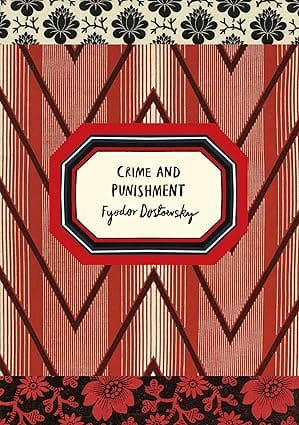WELCOME TO MIDLAND BOOK SHOP!
SHOP FOR
- Contemporary Fiction
- Contemporary Fiction
- Children
- Children
- Comics & Graphic Novels
- Comics & Graphic Novels
- Non-Fiction
- Non-Fiction
- Fiction
- Fiction
Shop No.20, Aurobindo Palace Market, Hauz Khas, Near Church +91 9818282497 | 011 26867121 110016 New Delhi IN
Midland The Book Shop ™
Shop No.20, Aurobindo Palace Market, Hauz Khas, Near Church +91 9818282497 | 011 26867121 New Delhi, IN
+919871604786 https://www.midlandbookshop.com/s/607fe93d7eafcac1f2c73ea4/6468e33c3c35585403eee048/without-tag-line-480x480.png" [email protected]9781784871970 673f21c12855d2003e05f149 Crime And Punishment https://www.midlandbookshop.com/s/607fe93d7eafcac1f2c73ea4/673f21c22855d2003e05f151/a18vzalpbkl-_sy425_.jpg Consumed by the idea of his own special destiny, immured in poverty and deprivation, Rashkolnikov is drawn to commit a terrible crime. In the aftermath, Rashkolnikov is dogged by madness, guilt and a calculating detective and a feverish cat-and-mouse game unfolds. the only hope for redemption, if Rashkolnikov can but recognise it, lies in the virtuous and faithful Sonya.
9781784871970
Consumed by the idea of his own special destiny, immured in poverty and deprivation, Rashkolnikov is drawn to commit a terrible crime. In the aftermath, Rashkolnikov is dogged by madness, guilt and a calculating detective and a feverish cat-and-mouse game unfolds. the only hope for redemption, if Rashkolnikov can but recognise it, lies in the virtuous and faithful Sonya.
The Vintage Classic Russians Series: Published for the 100th anniversary of the 1917 Russian Revolution, these are must-have, beautifully designed editions of six epic masterpieces that have survived controversy, censorship and suppression to influence decades of thought and artistic expression.
Review
Dostoevsky makes Martin Amis seem as if he was writing 130 years ago and that Dostoevsky is writing now. Read all of Dostoevsky. These books are for now and they matter, because it's up to us to call a halt to our TV producers, politicians, gutless artists, poets and writers: these "teenagers of all ages" who are propelling us towards a consumerist hell of disposability over quality -- Billy Childish
Dostoevsky's finest masterpiece - John Bayley
Donne, Herbert, Shakespeare, Jane Austen, George Eliot, Dostoevsky, Henry James - these are the great psychologists - far greater than Freud or Klein or Jung -- Sally Vickers
The best translation of Crime and Punishment currently available... An especially faithful re-creation...with a coiled-spring kinetic energy... Don't miss it - Washington Post
Crime and Punishment...is about a big subject - the meaning of life - yet it is gritty, gripping and it's depiction of city life gives it a modern, timeless feel -- Leila Aboulela, author of The Translator
Dostoevsky's finest masterpiece - John Bayley
Donne, Herbert, Shakespeare, Jane Austen, George Eliot, Dostoevsky, Henry James - these are the great psychologists - far greater than Freud or Klein or Jung -- Sally Vickers
The best translation of Crime and Punishment currently available... An especially faithful re-creation...with a coiled-spring kinetic energy... Don't miss it - Washington Post
Crime and Punishment...is about a big subject - the meaning of life - yet it is gritty, gripping and it's depiction of city life gives it a modern, timeless feel -- Leila Aboulela, author of The Translator
About the Author
Fyodor Dostoevsky was born in Moscow on 11th November 1821. He had six siblings and his mother died in 1837 and his father in 1839. He graduated from the St Petersburg Academy of Military Engineering in 1846 but decided to change careers and become a writer. His first book, Poor Folk, did very well but on 23rd April 1849 he was arrested for subversion and sentenced to death. After a mock-execution his sentence was commuted to hard labour in Siberia where he developed epilepsy. He was released in 1854. His 1860 book, The House of the Dead was based on these experiences. In 1857 he married Maria Dmitrievna Isaeva. After his release he adopted more conservative and traditional values and rejected his previous socialist position. In the following years he spent a lot of time abroad, struggled with an addiction to gambling and fell deeply in debt. His wife died in 1864 and he married Anna Grigoryeva Snitkina. In the following years he published his most enduring and successful books, includingCrime and Punishment (1865). He died on 9th February 1881.
in stockINR 600
1 1
Email ID already exists!
Your Current password is incorrect
Password Updated Successfully
Thanks for your Feedback
- Home
- Fiction
- Classic Text
- Crime And Punishment
Crime And Punishment
ISBN: 9781784871970
₹600
₹750 (20% OFF)SIZE GUIDE
Sold By: Hauz Khas - Aurobindo Market
Details
- ISBN: 9781784871970
- Author: Fyodor Dostoevsky
- Publisher: Vintage Classics
- Pages: 560
- Format: Paperback
Book Description
Consumed by the idea of his own special destiny, immured in poverty and deprivation, Rashkolnikov is drawn to commit a terrible crime. In the aftermath, Rashkolnikov is dogged by madness, guilt and a calculating detective and a feverish cat-and-mouse game unfolds. the only hope for redemption, if Rashkolnikov can but recognise it, lies in the virtuous and faithful Sonya.
The Vintage Classic Russians Series: Published for the 100th anniversary of the 1917 Russian Revolution, these are must-have, beautifully designed editions of six epic masterpieces that have survived controversy, censorship and suppression to influence decades of thought and artistic expression.
Review
Dostoevsky makes Martin Amis seem as if he was writing 130 years ago and that Dostoevsky is writing now. Read all of Dostoevsky. These books are for now and they matter, because it's up to us to call a halt to our TV producers, politicians, gutless artists, poets and writers: these "teenagers of all ages" who are propelling us towards a consumerist hell of disposability over quality -- Billy Childish
Dostoevsky's finest masterpiece - John Bayley
Donne, Herbert, Shakespeare, Jane Austen, George Eliot, Dostoevsky, Henry James - these are the great psychologists - far greater than Freud or Klein or Jung -- Sally Vickers
The best translation of Crime and Punishment currently available... An especially faithful re-creation...with a coiled-spring kinetic energy... Don't miss it - Washington Post
Crime and Punishment...is about a big subject - the meaning of life - yet it is gritty, gripping and it's depiction of city life gives it a modern, timeless feel -- Leila Aboulela, author of The Translator
Dostoevsky's finest masterpiece - John Bayley
Donne, Herbert, Shakespeare, Jane Austen, George Eliot, Dostoevsky, Henry James - these are the great psychologists - far greater than Freud or Klein or Jung -- Sally Vickers
The best translation of Crime and Punishment currently available... An especially faithful re-creation...with a coiled-spring kinetic energy... Don't miss it - Washington Post
Crime and Punishment...is about a big subject - the meaning of life - yet it is gritty, gripping and it's depiction of city life gives it a modern, timeless feel -- Leila Aboulela, author of The Translator
About the Author
Fyodor Dostoevsky was born in Moscow on 11th November 1821. He had six siblings and his mother died in 1837 and his father in 1839. He graduated from the St Petersburg Academy of Military Engineering in 1846 but decided to change careers and become a writer. His first book, Poor Folk, did very well but on 23rd April 1849 he was arrested for subversion and sentenced to death. After a mock-execution his sentence was commuted to hard labour in Siberia where he developed epilepsy. He was released in 1854. His 1860 book, The House of the Dead was based on these experiences. In 1857 he married Maria Dmitrievna Isaeva. After his release he adopted more conservative and traditional values and rejected his previous socialist position. In the following years he spent a lot of time abroad, struggled with an addiction to gambling and fell deeply in debt. His wife died in 1864 and he married Anna Grigoryeva Snitkina. In the following years he published his most enduring and successful books, includingCrime and Punishment (1865). He died on 9th February 1881.
User reviews
NEWSLETTER
Subscribe to get Email Updates!
Thanks for subscribing.
Your response has been recorded.

India's Iconic & Independent Book Store offering a vast selection of books across a variety of genres Since 1978.
"We Believe In The Power of Books" Our mission is to make books accessible to everyone, and to cultivate a culture of reading and learning. We strive to provide a wide range of books, from classic literature, sci-fi and fantasy, to graphic novels, biographies and self-help books, so that everyone can find something to read.
Whether you’re looking for your next great read, a gift for someone special, or just browsing, Midland is here to make your book-buying experience easy and enjoyable.
We are shipping pan India and across the world.
For Bulk Order / Corporate Gifting
 +91 9818282497 |
+91 9818282497 |  [email protected]
[email protected]
Click To Know More
INFORMATION
ACCOUNT
QUICK LINKS
ADDRESS
Midland Book Shop - Hauz Khas
Shop No.20, Aurobindo Palace Market, Near Church, New Delhi
Shop No.20, Aurobindo Palace Market, Near Church, New Delhi













